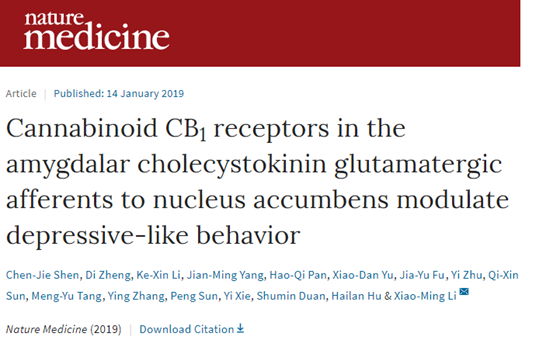A team headed by Professor LI Xiaoming, executive president of Zhejiang University School of Medicine, made a major breakthrough in the study of depression.LI XiaomingLI Xiaoming, made a major breakthrough in the study of depression. The study found that the new molecular- and circuit- mechanism mediating the pathogenesis of depression, which were published in the January 15th issue of Nature Medicine.

In a five-year study, theLI XiaomingLI XiaomingProfessor LI Xiaoming;s team focused on a brain area called the amygdala. Traditional studies suggest that the amygdala is encoding our fear memory. In recent years, evidence from human human studies implicating changes in volume, metabolism, valence response of the BLA in depressed patients, however, how BLA-related neural circuits are involved in the pathogenesis of depression remains largely unexplored.
They identified that basic lateral amygdala cholecystokinin (CCK) glutamatergic neurons mediated negative reinforcement via D2 medium spiny neurons in the nucleus accumbens, and that chronic social defeat selectively potentiated excitatory transmission of the CCKBLA-D2NAc circuit in susceptible mice via reduction of presynaptic cannabinoid type-1 receptors. Knockdown of cannabinoid receptors in the CCKBLA-D2NAc circuit elevated synaptic activity and promoted stress susceptibility. Notably, selective inhibition of the CCKBLA-D2NAc circuit or administration of synthetic cannabinoids in the nucleus accumbens was sufficient to produce antidepressant-like effects. Overall, Their studies reveal novel circuit and molecular mechanisms of depression.

"Medical cannabis is still a long way to go for the treatment of depression," Professor LI XiaomingLI Xiaoming said. "However, our research suggests that cannabinoid receptors can be used as a biomarker for the diagnosis of depression. A clinical PET tracer for cannabinoid receptors was synthesized in our lab and relevant clinical studies are being carried out."
Reviewers of Nature Medicine magazine commented on the research as being “The work represents a considerable conceptual advance in will likely have a major impact on the conceptualization of MDD, stress neurobiology, and synaptic organization/function of BLA circuits.” and a “the authors provide strong evidence for the important role of CB1-R expressed on BLA CCK+ glutamatergic neurons modulation in the response to severe stress. ”

The study was funded by the National Natural Science Foundation of China and is one of the key projects of NSFC's“Major Research Plan for Emotion and Memory Neural Circuits Base”.